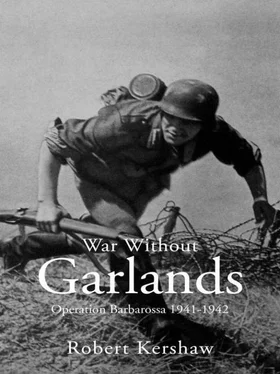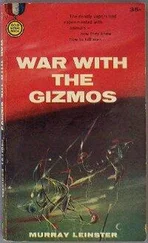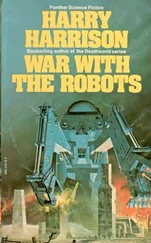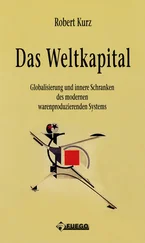Robert Kershaw - War Without Garlands
Здесь есть возможность читать онлайн «Robert Kershaw - War Without Garlands» весь текст электронной книги совершенно бесплатно (целиком полную версию без сокращений). В некоторых случаях можно слушать аудио, скачать через торрент в формате fb2 и присутствует краткое содержание. Город: Hersham, Год выпуска: 2010, ISBN: 2010, Издательство: Ian Allan Publishing, Жанр: military_history, на английском языке. Описание произведения, (предисловие) а так же отзывы посетителей доступны на портале библиотеки ЛибКат.
- Название:War Without Garlands
- Автор:
- Издательство:Ian Allan Publishing
- Жанр:
- Год:2010
- Город:Hersham
- ISBN:978-07110-3590-1
- Рейтинг книги:5 / 5. Голосов: 1
-
Избранное:Добавить в избранное
- Отзывы:
-
Ваша оценка:
- 100
- 1
- 2
- 3
- 4
- 5
War Without Garlands: краткое содержание, описание и аннотация
Предлагаем к чтению аннотацию, описание, краткое содержание или предисловие (зависит от того, что написал сам автор книги «War Without Garlands»). Если вы не нашли необходимую информацию о книге — напишите в комментариях, мы постараемся отыскать её.
War Without Garlands — читать онлайн бесплатно полную книгу (весь текст) целиком
Ниже представлен текст книги, разбитый по страницам. Система сохранения места последней прочитанной страницы, позволяет с удобством читать онлайн бесплатно книгу «War Without Garlands», без необходимости каждый раз заново искать на чём Вы остановились. Поставьте закладку, и сможете в любой момент перейти на страницу, на которой закончили чтение.
Интервал:
Закладка:
All along the Russo-German demarcation line in Poland troops began to be increasingly aware of the imminence of a massive new campaign. ‘So many troops are about here,’ wrote home one Gefreiter as early as April, ‘who share a like fate to ours, and their numbers still increase daily.’ Another commented, ‘You couldn’t be bored here because the roads are overflowing with the military. What are the next few days going to bring?’ Hopefully some improvement, because he declared with some exasperation:
‘whether it’s going to amount to yet another war within the year? I am just about fed up with the war, and would rather do something else as spend yet another year gadding about in uniform.’ (10)
Planning for ‘Barbarossa’ occurred selectively, initially on a strict ‘need to know’ basis. Hitler declared his intention on 31 July 1940, after which preparations started. Major Karl Wilhelm Thilo, a young staff officer working in the operations section of OKH, recorded in his diary how on 21 September OKH in Fontainebleau declared:
‘On the order of the Führer, Russia is to be photographed from the air up to 300km beyond its borders; preparations for invasion. I myself have to work on a mission for the German Military Attaché in Moscow to reconnoitre routes and communications for three spearheads.’
Eleven days later Thilo recorded that the German Military Attaché on Russian autumn manoeuvres ‘states that everyone there is expecting war against Germany in 1941; after England it will be Russia’s turn’. (11)General Günther Blumentritt, the Fourth Army Chief of Staff, commented that neither the commander – Generalfeldmarschall von Kluge – nor his staff received any indication of a possible war with Russia until January 1941. (12)Planning then continued apace, unabated until the execution in June. Halder had by the end of the same month encapsulated the mission: ‘Commit all available units’ (he foresaw 144 divisions on 29 January) and ‘crush Russia in a rapid campaign.’ He noted the main imperatives shaping the execution. ‘Space’ stretching to the Dnieper – the initial phase line – was the equivalent in distance from Luxembourg to the mouth of the Loire. ‘Speed. No Stop!’ Halder noted. The dependency would be on motorised transport, not railways. ‘Increased motorisation’ must result compared to the French campaign of 1940; he foresaw the need to create 33 mobile units. (13)
During spring 1941 more and more divisions were moved to the east and preparations intensified as the skeleton staffs of the senior commands began to establish themselves in situ. ‘A strange atmosphere prevailed during these months,’ commented General Blumentritt. Many of the senior staff officers had fought as junior commanders in Russia in 1914–18 ‘and we knew what to expect,’ he declared.
‘There was uneasiness both among the staff officers and in the divisions. On the other hand duty demanded precise and detailed work. All books and maps concerning Russia soon disappeared from the bookshops.’ (14)
Evidence of this precision has survived in contemporary documentation and maps relating to the operation. Atlases were produced with special wallet editions showing distances to Moscow, highlighting Red Army barracks, industrial installations, rail networks, power, hospitals and local government. Tactical information indicating terrain ‘going’, temperatures, snowfall, incidence of mist and other meteorological details was given in tabular and map form. Painstaking preparation including photograph albums even showed which buildings were to be demolished in Moscow, while booklets mapping towns in White Russia showed a sinister yellow line, highlighting the main through-routes to Moscow. (15)Blumentritt observed:
‘In particular, Napoleon’s 1812 campaign was the subject of much study. Kluge read General de Caulaincourt’s account of that campaign with the greatest attention: it revealed the difficulties of fighting, and even living in Russia… we knew that we would soon be following in Napoleon’s footsteps.’
Two historical invasions had penetrated the depth and vastness of Russia: Charles XII of Sweden, defeated at Poltava in 1709, and Napoleon’s invasion of 1812. The latter was of particular interest because it took the proposed German direct route to Smolensk. Accounts of these campaigns were read avidly. ‘I remember that Kluge’s desk at his Warsaw headquarters was usually laden with such publications,’ (16)remarked the Fourth Army Chief of Staff. Previous invasions had been defeated by long marches, shortages of supplies, tenacious resistance by the inhabitants and the awful Russian winter. They were food for thought and prompted foreboding. Nisbet Bain had written in 1895 of the severity of the Russian winter of 1708 that fatally weakened Charles XII’s Swedish Army, where ‘in the vast open steppes of the Ukraine… birds dropped down dead from the trees and wine and spirits froze into solid masses of ice.’ Hilaire Belloc described the change of weather experienced by French sentries in 1812 in terms of being stalked by a living beast:
‘What they felt as the night advanced was a new thing to them… a thing no Westerner among them had yet known – the winter advancing from out of Asia, from the frozen steppes… It came through the thick fog like something sentient… Men talk of having breathed that night an air itself freezing, and of having felt the rasp of that air so that they could only breathe through the coverings over the mouth.’ (17)
Many of the German officers who had fought in Russia during World War 1, now commanding formations, had cause to ponder their first-hand experience of the tenacity of the Russian soldier.
German planners, however, believed that potential historical similarities were outweighed by the technological and ideological differences applying now. German racist beliefs, fundamental to the ‘Barbarossa’ conception, spawned miscalculations. The capacity of resistance of the Soviet Union, its population and industrial potential was measured in Slav sub-human terms. All that was required according to Hitler was to ‘kick in the door and the whole regime would collapse like a house of cards’. ‘The Russian is inferior,’ noted Halder recording a Führer conference on 5 December 1940, and ‘the Army lacks leadership’. A short Blitzkrieg campaign was sure to succeed: ‘when the Russian Army is battered once, the final disaster is unavoidable,’ he predicted. (18)
Hitler’s previous respect for the Red Army had mellowed following its disastrous performance in the Russo-Finnish war of 1939. There was awareness of the inner turmoil Stalin’s purges had visited on the Soviet officer corps. Intelligence pointed to the shortage of experienced commanding officers. German attachés graded the Russian higher officer corps as ‘decidedly bad’, a ‘depressing impression’ and that ‘compared with 1933 [the] picture is strikingly negative. It will take Russia 20 years to reach her old level.’ (19)Few military observers had been impressed, furthermore, by the Red Army’s recent annexation of eastern Poland in concert with the Wehrmacht in 1939. A young artillery NCO taking part in the ‘farewell’ parade from Brest-Litovsk on 22 September that year commented upon the motorised procession that paraded before General Guderian and a Russian brigadier-general, remarking:
‘The Soviets made a right poor impression. The vehicles, above all the tanks, were – I must say – a collection of oily junk.’ (20)
Planning for Operation ‘Barbarossa’ tended, as a result, to concentrate on operational aspects, with less regard paid to the logistic effort required to sustain the three massive spearheads envisaged. Generalleutnant Paulus co-ordinated the effort from September 1940. It was anticipated the Soviets would defend along a line of the Dnieper–Berezina–Polotsk, north of Riga in the Baltic states. Three German army groups were formed to pierce it: one to the south and two to the north of the Pripet Marshes lying between them. Hitler’s primary objectives were economic, allied to a general desire to trap and swiftly destroy the Red Army in the west of Russia, before it could escape. Lebensraum dictated the need to annex the rich Ukrainian grainlands and the industrial area of the Donets basin, and eventually the Caucasian oil fields. Von Brauchitsch, the Commander-in-Chief, and his Chief of Staff, Halder, were motivated by an operational imperative: destroy the Red Army; economic prizes would follow.
Читать дальшеИнтервал:
Закладка:
Похожие книги на «War Without Garlands»
Представляем Вашему вниманию похожие книги на «War Without Garlands» списком для выбора. Мы отобрали схожую по названию и смыслу литературу в надежде предоставить читателям больше вариантов отыскать новые, интересные, ещё непрочитанные произведения.
Обсуждение, отзывы о книге «War Without Garlands» и просто собственные мнения читателей. Оставьте ваши комментарии, напишите, что Вы думаете о произведении, его смысле или главных героях. Укажите что конкретно понравилось, а что нет, и почему Вы так считаете.












